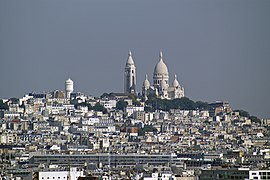18th arrondissement of Paris
18th arrondissement of Paris | |
|---|---|
 View over Montmartre district | |
 Location within Paris | |
| Coordinates: 48°53′32″N 2°20′40″E / 48.89222°N 2.34444°ECoordinates: 48°53′32″N 2°20′40″E / 48.89222°N 2.34444°E | |
| Country | France |
| Region | Île-de-France |
| Department | Paris |
| Commune | Paris |
| Government | |
| • Mayor (2020–2026) | Éric Lejoindre (PS) |
| Area | 6.01 km2 (2.32 sq mi) |
| Population (Jan. 2018)[1] | 193,665 |
| • Density | 32,224/km2 (83,460/sq mi) |
| INSEE code | 75118 |
| The 20 arrondissements of Paris | |||||||||||||||||||||||||||||||||||||
|---|---|---|---|---|---|---|---|---|---|---|---|---|---|---|---|---|---|---|---|---|---|---|---|---|---|---|---|---|---|---|---|---|---|---|---|---|---|
| |||||||||||||||||||||||||||||||||||||
The 18th arrondissement of Paris (XVIIIe arrondissement) is one of the 20 arrondissements of the capital city of France. In spoken French, this arrondissement is referred to as dix-huitième.
The arrondissement, known as Butte-Montmartre, is located on the right bank of the River Seine. It is mostly known for hosting the district of Montmartre which contains a hill known for its artistic history, the Bateau-Lavoir where Pablo Picasso, Georges Braque, and Amedeo Modigliani lived and worked in early 20th century,[2] the house of music diva Dalida, the Moulin Rouge cabaret, other historic features, and the prominent Sacré Cœur basilica which sits atop the hill.
The 18th arrondissement also contains the North African and African district of Goutte d'Or which is famous for its market, the marché Barbès, where one can find various products from the African continent.
Geography[edit]
The land area of this arrondissement is exactly 6.005 km2 (2.319 sq. miles, or 1,484 acres).
Demographics[edit]
The population of Paris's 18th arrondissement peaked in 1931 with 288,810 inhabitants. Today, the arrondissement remains very dense in population and business activity with 200,631 inhabitants as of the most recent census (2009).
Historical population[edit]
| Year (of French censuses) | Population | Density (inh. per km2) |
|---|---|---|
| 1872 | 138,109 | 22,980 |
| 1931 (peak of population) | 288,810 | 48,095 |
| 1954 | 266,825 | 44,397 |
| 1962 | 254,974 | 42,460 |
| 1968 | 236,776 | 39,430 |
| 1975 | 208,970 | 34,799 |
| 1982 | 186,866 | 31,118 |
| 1990 | 187,657 | 31,250 |
| 1999 | 184,586 | 30,739 |
| 2009 | 200,631 | 33,383 |
Immigration[edit]
In 2012, John Henley of The Guardian said the 18th arrondissement was "an area comparable in many ways to London's Tower Hamlets."[3]
| Born in metropolitan France | Born outside metropolitan France | |||
|---|---|---|---|---|
| 72.5% | 27.5% | |||
| Born in overseas France | Born in foreign countries with French citizenship at birth1 | EU-15 immigrants2 | Non-EU-15 immigrants | |
| 1.9% | 3.6% | 3.9% | 18.1% | |
| 1 This group is made up largely of former French settlers, such as Pieds-Noirs in Northwest Africa, followed by former colonial citizens who had French citizenship at birth (such as was often the case for the native elite in French colonies), as well as to a lesser extent foreign-born children of French expatriates. Note that a foreign country is understood as a country not part of France in 1999, so a person born for example in 1950 in Algeria, when Algeria was an integral part of France, is nonetheless listed as a person born in a foreign country in French statistics. 2 An immigrant is a person born in a foreign country not having French citizenship at birth. Note that an immigrant may have acquired French citizenship since moving to France, but is still considered an immigrant in French statistics. On the other hand, persons born in France with foreign citizenship (the children of immigrants) are not listed as immigrants. | ||||
| The 20 arrondissements of Paris | |||||||||||||||||||||||||||||||||||||
|---|---|---|---|---|---|---|---|---|---|---|---|---|---|---|---|---|---|---|---|---|---|---|---|---|---|---|---|---|---|---|---|---|---|---|---|---|---|
| |||||||||||||||||||||||||||||||||||||
Cityscape[edit]
Places of interest[edit]
- Basilique du Sacré-Cœur, Paris
- Basilica of Sainte-Jeanne-d'Arc (Paris)
- Église Saint-Jean-de-Montmartre
- Église Saint-Bernard de la Chapelle
- Moulin Rouge
- Musée d'Art Naïf - Max Fourny
The Serbian Orthodox Eparchy of Western Europe has its headquarters in the arrondissement.[4]
Districts within the 18th arrondissement[edit]
- Montmartre
- Pigalle
- Goutte d'Or, a working-class neighborhood in the arrondissement
- Quartier de La Chapelle
Economy[edit]
Dailymotion formerly had its headquarters in the arrondissement.[5] In addition, Dargaud also has its headquarters there.[6]
References[edit]
- ^ "Populations légales 2018". INSEE. 28 December 2020.
- ^ "Montmartre, Paris' last village. Facts". Paris Digest. 2018. Retrieved 2018-11-26.
- ^ Henley, John. "French elections: 'Here, immigration really and honestly isn't an issue'." The Guardian. Sunday 6 May 2012. Retrieved on 22 October 2012.
- ^ "Paroisses." Serbian Orthodox Eparchy of Western Europe. Retrieved on 27 February 2011. "EGLISE ORTHODOXE SERBE / BP177 - 75864 Paris - 23 rue du Simplon - 75018 Paris"
- ^ "About us." Dailymotion. Retrieved on 5 January 2010. "Registered office: 49/51 rue Ganneron, 75018 Paris."
- ^ "Mentions légales Archived 2011-04-07 at the Wayback Machine." Dargaud. Retrieved on 1 May 2011. "15/27 rue Moussorgski 75018 Paris"
External links[edit]
| Wikimedia Commons has media related to Paris 18e arrondissement. |
 18th arrondissement travel guide from Wikivoyage
18th arrondissement travel guide from Wikivoyage


No comments:
Post a Comment